情态动词二
(完整版)情态动词的基本用法归纳
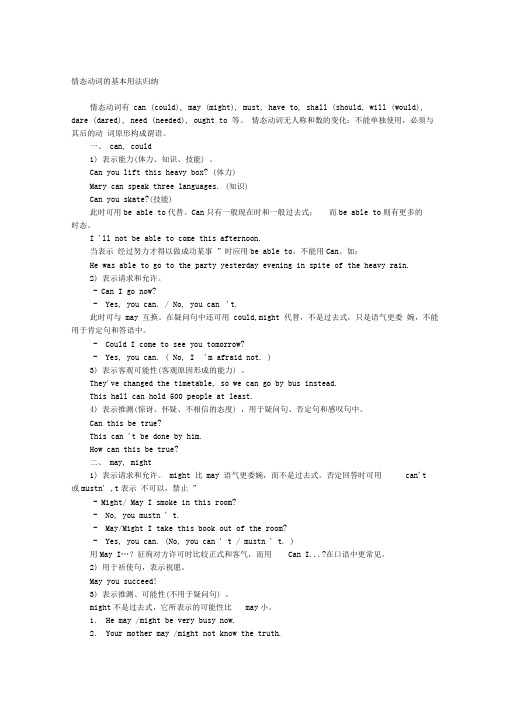
情态动词的基本用法归纳情态动词有can (could), may (might), must, have to, shall (should, will (would), dare (dared), need (needed), ought to 等。
情态动词无人称和数的变化;不能单独使用,必须与其后的动词原形构成谓语。
一、can, could1)表示能力(体力、知识、技能) 。
Can you lift this heavy box? (体力)Mary can speak three languages. (知识)Can you skate?(技能)此时可用be able to代替。
Can只有一般现在时和一般过去式;而be able to则有更多的时态。
I 'll not be able to come this afternoon.当表示经过努力才得以做成功某事”时应用be able to,不能用Can。
如:He was able to go to the party yesterday evening in spite of the heavy rain.2)表示请求和允许。
- Can I go now?- Yes, you can. / No, you can 't.此时可与may 互换。
在疑问句中还可用could,might 代替,不是过去式,只是语气更委婉,不能用于肯定句和答语中。
- Could I come to see you tomorrow?- Yes, you can. ( No, I 'm afraid not. )3)表示客观可能性(客观原因形成的能力) 。
They've changed the timetable, so we can go by bus instead.This hall can hold 500 people at least.4)表示推测(惊讶、怀疑、不相信的态度) ,用于疑问句、否定句和感叹句中。
情态动词小结(共五则)

情态动词小结(共五则)第一篇:情态动词小结情态动词小结情态动词有:can(could),may(might),must,have to, shall(should),will(would),need, dare, ought to等。
一.情态动词can, may, must用法㈠基本用法1.can ⑴ 会,能够--Can you swim?--Yes, I can.--No, I can‟t.⑵口语中代替may.You can(may)park here.你可以把车停在这里。
(许可)2.may允许,许可--May I come in?--Yes, you may./Sure, come on in.--No, you mustn ‟t./No, you can‟t.No, you‟d better not.3.must必须--Must we finish the exercise today?--Yes, you must.--No, you needn‟t./No, you don‟t have to.4.need 需要,必需--Need you go now?=--Must you go now?--Yes, I must.--Yes, I must.--No, I needn‟t.--No, I needn‟t.(need作为情态动词,通常用在否定句和疑问句中。
)注意一:can 与be able to 都可以表示“能力”,区别是:⑴ can只有现在和过去两种形式I can play the piano.She couldn‟t play the piano when she was a little girl.⑵ be able to ①有更多的形式和时态We shall/will be able to finish the work next week.I haven‟t been able to find the book.②指具体一次活动I can swim but I am not able to cross the rough sea.有时两者可以互换: I‟m not able to(can‟t)answer your question.Are you able to(Can you)type(打字)?注意二:could的用法⑴ 作为can的过去式,表示过去的能力。
语法2情态动词及动词的时态语态

16) Jack _______ yet, otherwise he would have telephoned me. (97 上海卷) A. mustn’t have arrived B. shouldn’t have arrived
C. can’t have arrived D. need not have arrived 答案 C 17) “ Could I call you by your first name?” “ Yes, you _______.” A. will 答案 C B. could (98 上海卷) C. may D. might
4) The fire spread through the hotel very quickly, but everyone _______ get out. (NMET97) A. had to 答案 B. would C. could D. was able to
D 5) “When can I come for the photos? I need them tomorrow afternoon.” “They _______ be ready by 12:00.” (NMET 98) A. can 答案 B B. should C. might D. need
18) There was a lot of fun at yesterday’s party. You ______ come, but why didn’t you? (99 上海卷) A. must have C. need have 答案 D B. should D. ought to have
4、现在进行时: 1)、 have, be, hear, see, like, remember, find 及 sound等一般不用进行时。 2)、 go, come, start, leave及arrive可用进行时表 示将来。 3)、be always doing表示正在干…,常有责备或表扬 之意。 4)、be asking for trouble习惯都用进行时。
语法难点突破之二情态动词

We use modal verbs to talk about:
01
Ability (能力) Obligation (义务) Certainty (可能性) Permission (允许)
02
We also use modal verbs to:
01
Make requests(提出请求) Make suggestions(提出建议) Make offers(提供帮助) Give advice(提出意见)
Can you help me with my training?
I don’t know how to use this equipment!
will can could would
informal
formal
A.may B.might C.must
A.may B.might C.must
(can)
01
This must be your pen.
He must be doing his homework now.
He must have arrived already.
祝你成功!
用于祈使句中表示祝愿。 May you be happy all your life.
表示推测、可能(只用于肯定句,疑问句则要用can或could)。 May you succeed. He may be very busy now.
may/might:
5.Making requests (提出要求):
We should learn from each other. 我们应当要相互学习。
should:
I should advise you not to do that again.
情态动词练习题二(解析

情态动词练习题二(解析一、单项选择情态动词1.No student ________ go out of school to have lunch without permission of the headteacher. A.might B.mustC.shall D.could【答案】C【解析】【详解】考查情态动词。
句意:未经校长允许,任何学生不得离开学校去吃午饭。
might可能;must一定,必须;shall会,将;could能够。
本句是一条禁令。
shall用于肯定句并且主语是第一、三人称时,表示允诺,警告,劝告等语气。
故选C。
2.—I don’t really like Janes. Why did you invite him?—Don’t worry. He come. He said he was’t certain what his plans were.A.must not B.need not C.would not D.might not【答案】D【解析】考察情态动词,题干中的he wasn’t certain说明他可能不来,可能来,因此使用不完全否定,might not。
3.They were abroad during the months when we were carrying out the investigation, or they __________to our help.A.would have come B.could comeC.have come D.had come【答案】A【解析】试题分析:本句考查的是一个含蓄的虚拟条件句,句中的or相当于if they had not gone abroad.因为前面句中使用的是were,说明这个虚拟语气是与过去事实相反,所以主句中使用的是“情态动词+have done”的形式。
句意:当我们在做调查的那几个月里,他们一直在国外,否则的话他们早就来帮助我们了。
英语情态动词用法归纳

英语情态动词用法归纳情态动词有具体的词义,但也同助动词一样,需要与其他词语一起构成句子的谓语,另外情态动词没有人称和数的变化,情态动词后必须跟动词原形。
那么接下来给大家分享一些关于英语情态动词用法归纳,希望对大家有所帮助。
英语情态动词用法归纳1. can 的用法:(1).表示能力、许可、可能性。
表示能力时一般译为“能、会”,即有种能力,尤其是生来具备的能力,此时may 和must均不可代替它。
如:She can swim fast, but I can’t . 她能游得很快,但我不能。
I can see with my eyes. 我用眼睛看。
(2).表示许可,常在口语中。
如:You can use my dictionary. 你可以用我的字典。
(3).表示推测,意为“可能”,常用于否定句和疑问句中,此时can’t 译为“ 不可能”。
如:Can the news be true? 这个消息会是真的吗?—Can it be our teacher?那个人有可能是我们老师吗?—No, it can’t be our teacher. He is on a visit to the Great Wall.不可能。
咱们老师正在游览长城呢。
【例题】—I think Miss Gao must be in the library. She said she would go there. —No. She __be there, I have just been there.A.can’tB.mustn’tC.needn’tD.wouldn’t【解析】根据下文“我刚去过那儿”可知,应为“ 不可能”,can’t 表示推测[答案] A2. could的用法:(1).can的过去式,意为“ 能、会”,表示过去的能力。
如:He could write poems when he was 10. 他十岁时就会写诗。
情态动词(二)(讲义)

1. 基本掌握情态动词ought to、need等词的基本含义和用法。
2. 系统掌握情态动词用于表推测的用法和“情态动词+have done”的特殊含义。
重点:情态动词表示推测的基本用法与区别。
难点:识记并掌握“情态动词+have done”的特殊含义。
1. 情态动词是英语语言当中一个非常重要的元素,在各类文章和题型中经常出现,并且在高考语法填空和短文改错中也多有考查。
2. 情态动词的基本用法在阅读和书面表达当中也有着非常重要的影响,尤其是在写作中考生经常在情态动词用法上出错,需要引起重视。
ought to的用法By now his restaurant ought to be full of people.到了这个时候,他的餐馆本来应该是顾客盈门的。
1. ought to意为“应该,应当”,其后必须跟动词原形,只有一种形式,没有人称和数的变化。
2. ought to表示推测,暗含很大的可能性;还可表示“有义务或责任做某事”,语气比较强;还可表示“建议或劝告”。
3. ought to的否定形式为ought not to或oughtn’t to,其一般疑问句形式是将ought置于主语前。
4. “ought to+have done”结构相当于“should+have done”结构,表示“本应该做某事而事实上并没有做”,其否定结构表示“不该做某事实际上却做了”。
①You ought to make an apology to Joan.你应该向Joan道歉。
②Jeffrey ought to be there by now.Jeffrey现在应该在那儿了。
③You ought not to / oughtn’t to be late for such an important meeting.这么重要的会议你不应该迟到的。
④Ought I to hand in my composition now?我应该现在把我的作文上交吗?⑤You are late. You ought to / should have arrived five minutes earlier.你迟到了,你本应该早五分钟到的。
2020年中考英语重难点专练二 情态动词(含答案)

重难点02 情态动词【命题趋势】根据对情态动词部分在全国各地中考试题的分析可知,今后该部分将是重点考查之一。
其考查重点为:1. 情态动词在一般疑问句中的问与答2. 情态动词表示猜测的用法3. will与shall的用法4. dare 与need的用法【满分技巧】1. 充分利用句子语境综观历年中考英语情态动词的考查情况,有相当一部分考题从本质上看都是在考查情态动词在具体语境中的运用,即只要考生能弄清各个被考查情态动词的意思,就可作出正确选择。
2. 根据时间确定时态即要分清情态动词表推测时涉及的是现在情况还是过去情况。
原则上说,若对现在情况进行推测,情态动词后接动词原形或进行式。
3. 注意分清适用句型即要分清所考查的情态动词是用于肯定句型,还是用于疑问句型或否定句型,同时还要注意情态动词在某些特殊情况下所使用的特殊句型。
【限时检测】(建议用时:30分钟)1.【2019 •凉山州】We should keep quiet in the library. We speak loudly.A. mustB. mustn’tC. canD. needn’t【答案】B【解析】句意“我们在图书馆应该保持安静,我们禁止大声说话”。
A.must必须(表示主观看法),一定(用于肯定推测);B. mustn’t禁止;C.能,会(表示现在的能力);D.不需要。
根据句意可知,表示图书馆应该保持安静,禁止大声说话,故选B。
2.【2019 •新疆维吾尔族自治区】David, you please sweep the floor and take out the trash?A. couldB. mayC. mightD. must【答案】A【解析】句意:David,你能打扫一下地板,把垃圾倒掉吗?A. could能,会;B. may可以;C. might可以;D. must必须。
根据横线后面的内容,扫地板,倒垃圾,所知,是表示允许而且带有委婉的语气,could youplease+动词原形,表示请你做……好吗?故选A。
2017年高考英语二轮复习 核心考点总动员 专题14 情态动词(二)(含解析)
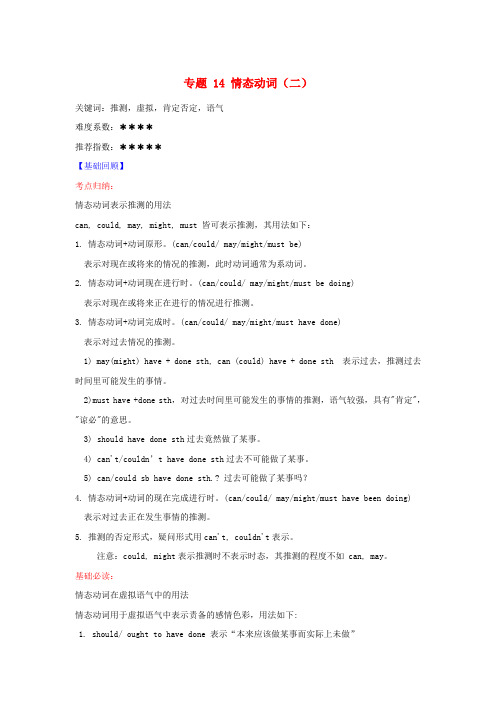
专题 14 情态动词(二)关键词:推测,虚拟,肯定否定,语气难度系数:✱✱✱✱推荐指数:✱✱✱✱✱【基础回顾】考点归纳:情态动词表示推测的用法can, could, may, might, must 皆可表示推测,其用法如下:1. 情态动词+动词原形。
(can/could/ may/might/must be)表示对现在或将来的情况的推测,此时动词通常为系动词。
2. 情态动词+动词现在进行时。
(can/could/ may/might/must be doing)表示对现在或将来正在进行的情况进行推测。
3. 情态动词+动词完成时。
(can/could/ may/might/must have done)表示对过去情况的推测。
1) may(might) have + done sth, can (could) have + done sth 表示过去,推测过去时间里可能发生的事情。
2)must have +done sth,对过去时间里可能发生的事情的推测,语气较强,具有"肯定","谅必"的意思。
3) should have done sth过去竟然做了某事。
4) can't/couldn’t have done sth过去不可能做了某事。
5) can/could sb have done sth.? 过去可能做了某事吗?4. 情态动词+动词的现在完成进行时。
(can/could/ may/might/must have been doing) 表示对过去正在发生事情的推测。
5. 推测的否定形式,疑问形式用can't, couldn't表示。
注意:could, might表示推测时不表示时态,其推测的程度不如 can, may。
基础必读:情态动词在虚拟语气中的用法情态动词用于虚拟语气中表示责备的感情色彩,用法如下:1. should/ ought to have done 表示“本来应该做某事而实际上未做”2.shouldn’t /ought not to have done 则表示“本不应该做某事而实际上做了”。
必修三unit2语法讲解情态动词用法(最新整理)
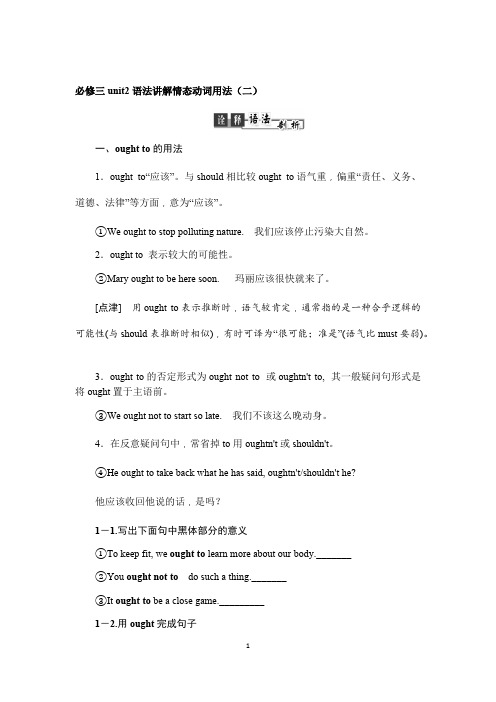
必修三unit2语法讲解情态动词用法(二)一、ought to的用法1.ought to“应该”。
与should相比较ought to语气重,偏重“责任、义务、道德、法律”等方面,意为“应该”。
①We ought to stop polluting nature. 我们应该停止污染大自然。
2.ought to 表示较大的可能性。
②Mary ought to be here soon. 玛丽应该很快就来了。
[点津] 用ought to表示推断时,语气较肯定,通常指的是一种合乎逻辑的可能性(与should表推断时相似),有时可译为“很可能;准是”(语气比must要弱)。
3.ought to的否定形式为ought not to 或oughtn't to, 其一般疑问句形式是将ought置于主语前。
③We ought not to start so late. 我们不该这么晚动身。
4.在反意疑问句中,常省掉to用oughtn't或shouldn't。
④He ought to take back what he has said, oughtn't/shouldn't he?他应该收回他说的话,是吗?1-1.写出下面句中黑体部分的意义①To keep fit, we ought to learn more about our body._______②You ought not to do such a thing._______③It ought to be a close game._________1-2.用ought完成句子④你不该责备他。
You ____________(scold )him.⑤我明天该动身吗?—______________(_leave )tomorrow?是的,你应该。
—Yes, you_ought_to.⑥我们现在应该走,是吗?We ought to go now, ____________?二、have to, don't have to与mustn't的用法1.have to(口语中常用have got to)表示客观需要做的事情,意为“必须;不得不”。
情态动词2
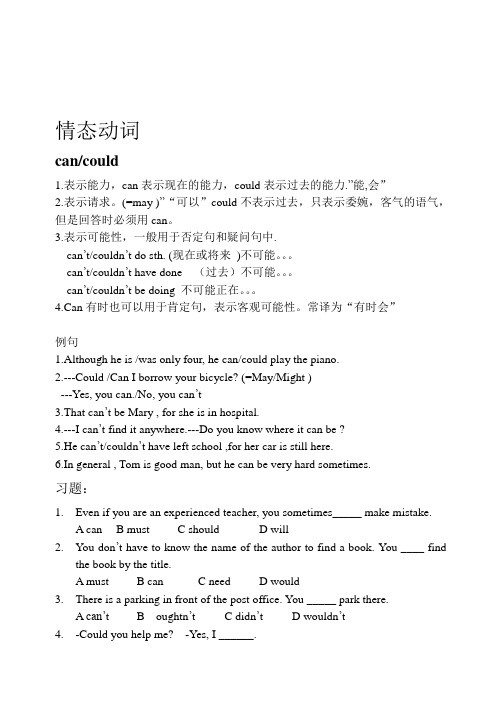
情态动词can/could1.表示能力,can表示现在的能力,could表示过去的能力.‖能,会”2.表示请求。
(=may )‖“可以”could不表示过去,只表示委婉,客气的语气,但是回答时必须用can。
3.表示可能性,一般用于否定句和疑问句中.can’t/couldn’t do sth. (现在或将来)不可能。
can’t/couldn’t have done (过去)不可能。
can’t/couldn’t be doing 不可能正在。
4.Can有时也可以用于肯定句,表示客观可能性。
常译为“有时会”例句1.Although he is /was only four, he can/could play the piano.2.---Could /Can I borrow your bicycle? (=May/Might )---Yes, you can./No, you can’t3.That can’t be Mary , for she is in hospital.4.---I can’t find it anywhere.---Do you know where it can be ?5.He can’t/couldn’t have left school ,for her car is still here.6.In general , Tom is good man, but he can be very hard sometimes.习题:1.Even if you are an experienced teacher, you sometimes_____ make mistake.A canB mustC shouldD will2.You don’t have to know the name of the author to find a book. You ____ findthe book by the title.A mustB canC needD would3.There is a parking in front of the post office. You _____ park there.A can’tB oughtn’tC didn’tD wouldn’t4.-Could you help me? -Yes, I ______.5.She _______ have left school, for her car is still here.A can’tB wouldn’tC shouldn’tD needn’t6.--I can’t find it anywhere.--Do you know where it _____ be?A canB mayC mightD mustmight/may1.表示请求,允许。
情态动词用法

können1.表示主观上有能力做某事,用直陈式,意为“能够”Er kann fließend Deutsch sprechen.他能流利地说德语。
Sie kann gut Tennis spielen.她能打一手好网球。
Wir können heute die Aufgaben erledigen.我们今天能完成任务。
2.表示一种客观的可能性In einem Jahr kann er das Haus bestimmt kaufen.一年后,他肯定能买下这所房子。
Dieses Ozeanschriff kann 800 Passagiere aufnehmen.这艘海轮能载800名旅客。
Ich konnte diese Frage nicht beantworten.我当时不可能回答这一问题。
3.表示猜测Er kann in die Stadt gefahren sein.他可能乘车进城去了。
Sie können sich schon verabredet haben.他们可能早就约定好了。
4.表示允许,许可(代替dürfen)Sie können jetzt gehen.(= dürfen)您现在可以走了。
5.表示礼貌用语,语言委婉,用第二虚拟式Könnte ich einen Blick in das Protokoll werfen?我可不可以看一下记录?müssen1.表示一种必要性,有义务,用直陈式,意为“必须”,“不得不”Er muss heute noch seine Mutter von Bahnhof abholen.他今天还得去车站接他母亲。
V or den Ferien muss ich noch eine Menge Aufgaben erledigen,放假之前,我还必须完成一大堆任务。
15第二章 情态动词
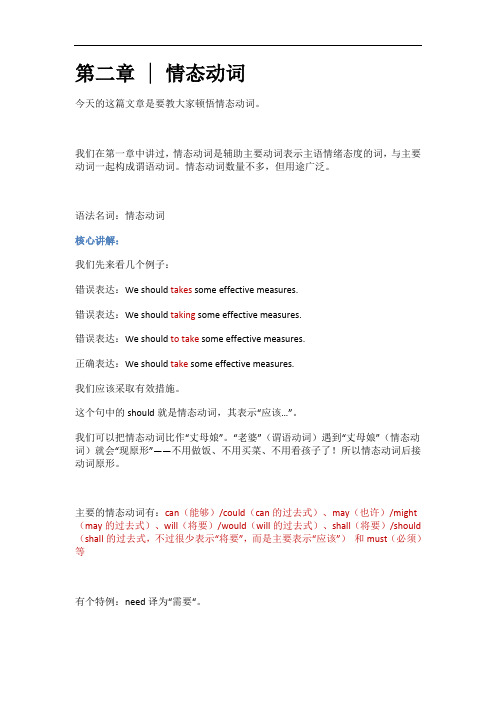
第二章 | 情态动词今天的这篇文章是要教大家顿悟情态动词。
我们在第一章中讲过,情态动词是辅助主要动词表示主语情绪态度的词,与主要动词一起构成谓语动词。
情态动词数量不多,但用途广泛。
语法名词:情态动词核心讲解:我们先来看几个例子:错误表达:We should takes some effective measures.错误表达:We should taking some effective measures.错误表达:We should to take some effective measures.正确表达:We should take some effective measures.我们应该采取有效措施。
这个句中的should就是情态动词,其表示“应该…”。
我们可以把情态动词比作“丈母娘”。
“老婆”(谓语动词)遇到“丈母娘”(情态动词)就会“现原形”——不用做饭、不用买菜、不用看孩子了!所以情态动词后接动词原形。
主要的情态动词有:can(能够)/could(can的过去式)、may(也许)/might (may的过去式)、will(将要)/would(will的过去式)、shall(将要)/should (shall的过去式,不过很少表示“将要”,而是主要表示“应该”)和must(必须)等有个特例:need译为“需要“。
need作为情态动词:I need know.这时候need和其他情态动词一样,后面的实意动词使用“原形”。
need作为实意动词:I need to know.这时候need和普通的实意动词一样使用(比如I want to know.)两种形式都对,该用哪种形式看个人爱好吧!要点拓展:一、情态动词的特征:1. We should get up early.(我们应该早点起床。
)2. My sister can sing this song very well.(我得妹妹能唱这首歌唱得非常好。
英语语法专项之情态动词2willwouldmusthavetoneed(课件)通用版英语

need开头的疑问句的回答
肯定回答要用must;否定回答用needn’t,表示“不必”。
-Need I give you some money ? 肯定回答:must -Yes, you must.
否定回答:needn’t
-No, you needn’t.
-Need I throw the trash right now? -Yes, ___________. -No, ____________.
无人称、数和时态的变化
have to
客观要求
For my eyes, I have to give up plaing video games.
有人称、数和时态的变化
Tom must learn to take care of himself.
It’s dark outside. Lucy has to go home now.
needn’t
否定式needn’t表示“不需要”
It’s Sunday. We needn’t go to school today. You needn’t blame yourself.
need/needn’t...
1. You __________(go) to the supermarket. I have already bought the milk. 2. You ________(say) sorry to your teahcer for being late. 3. She _________(go) to church if she doesn’t want to. 4. You __________(pay) now. You can pay me next week. 5. __________you _________(leave) right now? 6. ___________Millie _______(take) medicine in order to get well?
情态动词语法讲解及练习题(2)
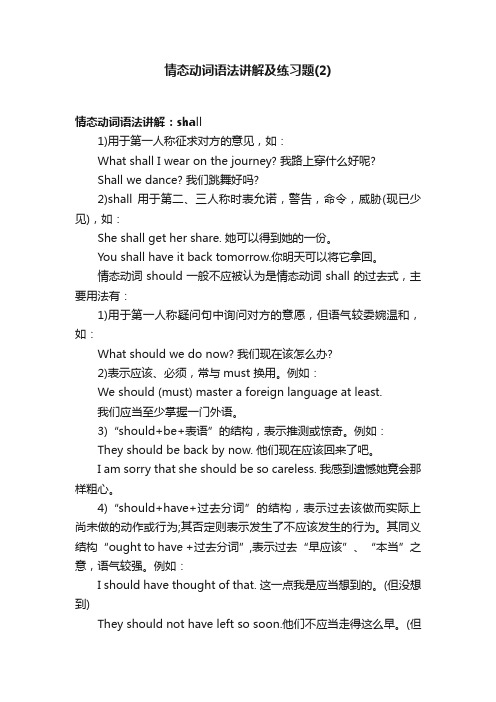
情态动词语法讲解及练习题(2)情态动词语法讲解:shall1)用于第一人称征求对方的意见,如:What shall I wear on the journey? 我路上穿什么好呢?Shall we dance? 我们跳舞好吗?2)shall 用于第二、三人称时表允诺,警告,命令,威胁(现已少见),如:She shall get her share. 她可以得到她的一份。
You shall have it back tomorrow.你明天可以将它拿回。
情态动词should一般不应被认为是情态动词shall的过去式,主要用法有:1)用于第一人称疑问句中询问对方的意愿,但语气较委婉温和,如:What should we do now? 我们现在该怎么办?2)表示应该、必须,常与must 换用。
例如:We should (must) master a foreign language at least.我们应当至少掌握一门外语。
3)“should+be+表语”的结构,表示推测或惊奇。
例如:They should be back by now. 他们现在应该回来了吧。
I am sorry that she should be so careless. 我感到遗憾她竟会那样粗心。
4)“should+have+过去分词”的结构,表示过去该做而实际上尚未做的动作或行为;其否定则表示发生了不应该发生的行为。
其同义结构“ought to have +过去分词”,表示过去“早应该”、“本当”之意,语气较强。
例如:I should have thought of that. 这一点我是应当想到的。
(但没想到)They should not have left so soon.他们不应当走得这么早。
(但已走了)5) 在“It is natural (strange, natural, necessary, surprised, impossible, important ) that……”句型中,主语从句中的谓语动词要用should +动词原形”表示“理所当然”、“奇怪”、“必要”、“惊异”等的意思。
情态动词的用法(二)

来练一练吧! 来练一练吧!
Only in summer________ . A A.will the ice melt B. the ice will melt C. the ice can melt D. the ice melts If you_______ wait a moment , I’ll go to see B if Mr. Johns is free . A. shall B. will C. would D. need
If you will come into the hall ,the meeting will begin soon. 请求)请到大厅里来, (请求)请到大厅里来,会议马上开始了 If you will make another try ,I shall do everything possible to help you . (意愿 如果你愿意再试一次的话,我愿近一切可能帮助你。 意愿)如果你愿意再试一次的话 意愿 如果你愿意再试一次的话,我愿近一切可能帮助你。 If he won't go with you ,I shall ask somebody else . (拒绝 如果他不肯同你一起去的话,我将另找人。 拒绝)如果他不肯同你一起去的话 拒绝 如果他不肯同你一起去的话,我将另找人。 If you will agree with me ,I shall tell you everything about it . (同意 如果你同意我的观点,我将把一切都告诉你。 同意)如果你同意我的观点 同意 如果你同意我的观点,我将把一切都告诉你。 If you will come late again ,I shall let you in . (允诺 如果你答应不再迟到,我就让你进去。 允诺)如果你答应不再迟到 允诺 如果你答应不再迟到,我就让你进去。 If anyone will find a cure to the disease ,it will be a winder . (能够 如果有人能够治好这种病,那将是一个奇迹。 能够)如果有人能够治好这种病 能够 如果有人能够治好这种病,那将是一个奇迹。 If you will do it like that ,you will fail.(坚持)坚持那样做,你就会失败。 (坚持)坚持那样做,你就会失败。 If you will buy bread ,I shall buy beer .(选择 如果你买面包,我就买啤酒。 选择)如果你买面包 选择 如果你买面包,我就买啤酒。 If you won‘t lend money to him,please let me know. , (计划 如果你不打算借钱给他,让我知道。 计划)如果你不打算借钱给他 计划 如果你不打算借钱给他,让我知道。
Book 3 Unit 2 Grammar 情态动词 (二)
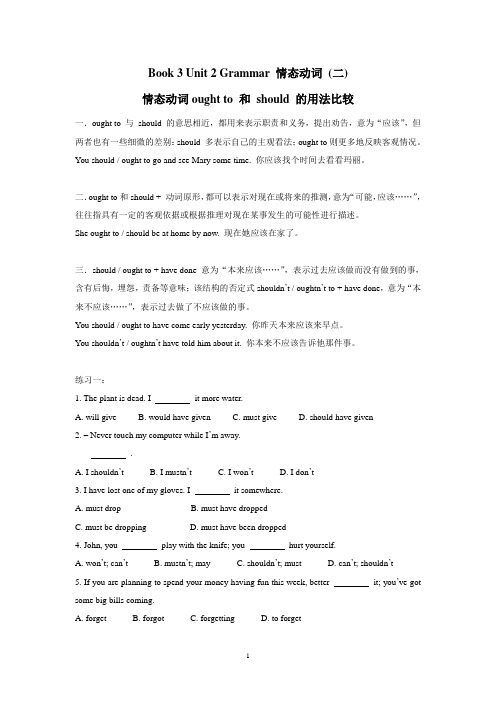
Book 3 Unit 2 Grammar 情态动词(二)情态动词ought to 和should 的用法比较一.ought to 与should 的意思相近,都用来表示职责和义务,提出劝告,意为“应该”,但两者也有一些细微的差别:should 多表示自己的主观看法;ought to则更多地反映客观情况。
You should / ought to go and see Mary some time. 你应该找个时间去看看玛丽。
二.ought to和should + 动词原形,都可以表示对现在或将来的推测,意为“可能,应该……”,往往指具有一定的客观依据或根据推理对现在某事发生的可能性进行描述。
She ought to / should be at home by now. 现在她应该在家了。
三.should / ought to + have done 意为“本来应该……”,表示过去应该做而没有做到的事,含有后悔,埋怨,责备等意味;该结构的否定式shouldn’t / oughtn’t to + have done,意为“本来不应该……”,表示过去做了不应该做的事。
You should / ought to have come early yesterday. 你昨天本来应该来早点。
You shouldn’t / oughtn’t have told him about it. 你本来不应该告诉他那件事。
练习一:1. The plant is dead. I it more water.A. will giveB. would have givenC. must giveD. should have given2. – Never touch my computer while I’m away.- .A. I shouldn’tB. I mustn’tC. I won’tD. I don’t3. I have lost one of my gloves. I it somewhere.A. must dropB. must have droppedC. must be droppingD. must have been dropped4. John, you play with the knife; you hurt yourself.A. won’t; can’tB. mustn’t; mayC. shouldn’t; mustD. can’t; shouldn’t5. If you are planning to spend your money having fun this week, better it; you’ve got some big bills coming.A. forgetB. forgotC. forgettingD. to forget6. You use my bike on condition that you give it tome before I leave here.A. shouldB. mustC. ought toD. shall7. The old man is always hunting the lions, so terrible things happen to him.A. canB. wouldC. shouldD. could8. – Are you coming to Jeff’s Party?- I’m not sure. I go to the concert insteadA. mustB. wouldC. shouldD. might9. – Shall I tell John about it?- No, you . I have told him already.A. needn’tB. wouldn’tC. mustn’tD. shouldn’t答案DCBBA DCDA。
高中英语必学语法之情态动词(二)

情态动词(二)●知识点精讲透析●考点一shall1. shall用于第二、三人称陈述句中,表示说话人给对方的命令,警告,允诺或威胁。
1) You shall go with me. (命令)2) You shall have the book when I finish it. (允诺)3) He shall be punished. (威胁)2. shall用于第一、三人称疑问句中,表示说话人征求对方的意见和向对方请示。
4) Shall we begin our class? (征求意见)5) When shall Mike be able to leave hospital? (请示)3.用于条约,规定,规章等文件中,表示一种义务,多用于第三人称中。
6)Candidates shall remain in their seats until all the papers have been collected. 试卷完全收回后,应试人才能离开座位。
过手训练1. I am busy now, _______ my brother do it for you?A. willB. shallC. mustD. may2. One of our rules is that every student _____ wear school uniform while at school.A. mightB. couldC. shallD. will●考点二should1. 表义务,意为“应该”(某件事宜于做),用于各种人陈。
例:You should be polite to your teachers. 你对老师应该有礼貌。
2. 表推测,意为“想必;一定,照说应该,估计等”。
例:The film should be very good as it is starring first class actors. 这部电影是一流演员主演的,估计拍得很好。
- 1、下载文档前请自行甄别文档内容的完整性,平台不提供额外的编辑、内容补充、找答案等附加服务。
- 2、"仅部分预览"的文档,不可在线预览部分如存在完整性等问题,可反馈申请退款(可完整预览的文档不适用该条件!)。
- 3、如文档侵犯您的权益,请联系客服反馈,我们会尽快为您处理(人工客服工作时间:9:00-18:30)。
Modal Verb(II)
一、ought to的用法
Ought没有时态和人称的变化,后面须跟带to的不定式。
(1)用于第一人称,表示有责任或有必要去做某事,与should相比,语气较弱;
We ought to be more careful with our homework.
(2)用于第二人称,表示建议或劝告;
You ought to give up smoking.
(3)用于第三人称,表示对现在或将来某种肯能性的推测,且这种推测是可信的;
He ought to come at once。
二、need的用法
Need既可作实义动词,也可作情态动词。
作情态动词时,表“需要、有必要”,无人称和数的变化;多用于疑问句、否定句和条件状语从句中。
You needn’t come early.
Need I tell you everything that has happened to me?
Yes, you must/have to. No,you needn’t.
三、dare的用法
(1)dare 既可作实义动词,也可作情态动词。
作情态动词时,表“敢......”,无人称和数的变化;多用于疑问句、否定句、条件状语从句以及表示怀疑的名词性从句中。
I dare not walk through the wood at night.
If you dare speak to me like that again,you’ll be sorry.
(2)dare作实义动词时,在否定句中不定式符号to也可以省略。
The children don’t dare to make a sound while their parents are sleeping.
四、情态动词+have done结构的用法
(1)may/might/must have done:表示对过去情况的推测或估计,表“想必或肯定(已经)做了某事;I must have seen you somewhere.
(2)could have done:表示本来能够做却没有做某事
can/couldn’t have done:表示对过去情况的否定性推测,表示不可能已经做了某事;
The train has left. You could have got up earlier.
I can/couldn’t have lost my key.
(3)should/ought to have done:表示本应该做而实际未做
shouldn’t/oughtn’t to have done:表示本不应该做而实际已经做了
I should have told you the bad news.
You shouldn’t have let anyone else know the secret.
(4)need have done:表示本需要而实际未做
needn’t have done:表示本不必做某事而实际做了
You needn’t have dressed so formally.
注意区分情态动词+not的真正含义:
may或许,可能,可以may not或许不,可能不
might可能,可以might not可能不
can能够,可能,可以can’t/can not不能,不可能
must必须,一定mustn’t不许,禁止
should应该shouldn’t不应该
need需要needn’t不必。
